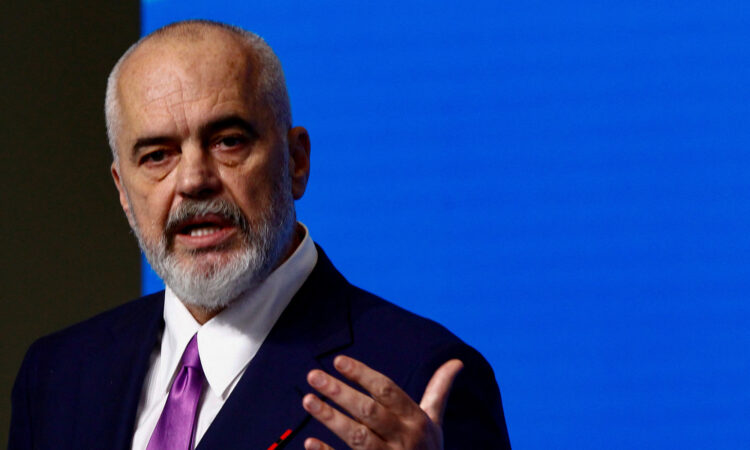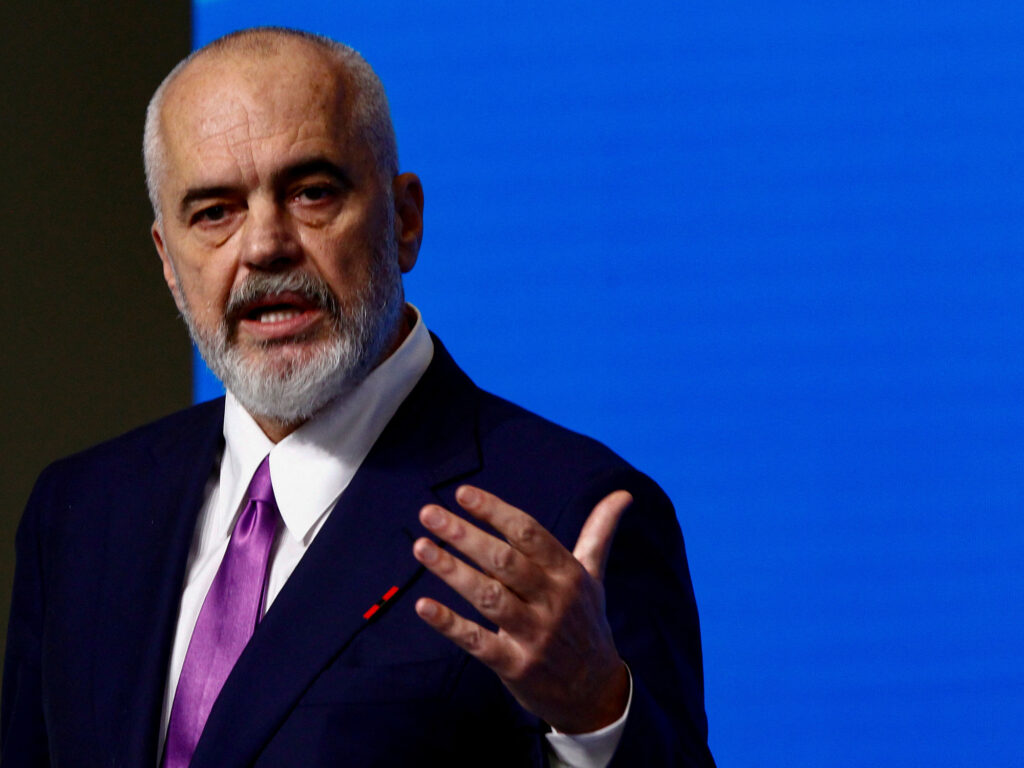Spillover from wars in the Middle East and Ukraine may spread to the Western Balkans, warns Albanian prime minister

Watch the full event
Today’s biggest conflicts—Russia’s aggression in Ukraine and the Israel-Hamas war—could have “dire” implications for already high tensions in the Western Balkans, said Albanian Prime Minister Edi Rama.
At an Atlantic Council Front Page event hosted by the Council’s Europe Center on Monday, Rama called Hamas and its supporters “true agents of chaos” and said that if the chaos spreads wider, simmering tensions in the Western Balkans could boil over.
The six countries that make up the Western Balkans thus must “work day and night to keep the conflict out of the borders of our region,” Rama asserted.
Below are more highlights from the conversation, moderated by Atlantic Council President and Chief Executive Officer Frederick Kempe, which touched upon the Kosovo-Serbia dispute, Albania’s new migrant deal with Italy, and Albania’s path to the European Union (EU).
Regional tensions
- On September 24, thirty armed and masked Serbs sparked a gun battle and barricaded themselves inside an Orthodox monastery in northern Kosovo, in an event that saw an officer and three of the attackers killed. Rama said that the event was a “strong sign” and “[alarm] bell” indicating how this unresolved issue can be a “detriment” to regional cooperation and peace.
- Rama explained that while the situation has somewhat improved, the region must work together to secure both “full recognition of Kosovo” and “final peace.”
- Rama said he is encouraged by Kosovar authorities warming to a proposal to establish an Association of Serb Municipalities, which would work on education, health care, and economic development for populations that are majority Serb. It would also unblock normalization talks with Serbia. If Kosovo agrees to the plan, “this will be huge,” Rama said. “Huge for the sake of Kosovo [and] huge for the sake of the region.”
- While Albania, which is celebrating 111 years of independence, and the region have come a long way, Rama said they need to do “a lot more” to address challenges that remain. With the world so “interconnected,” as Rama argued, each of the six Western Balkan countries has a responsibility to “improve our countries and improve our region and improve the world. One without the others does not really work.”
Migration crisis
- Tirana recently struck a deal with Rome to stand up centers under Italian jurisdiction in Albania for holding migrants seeking asylum in Italy. The deal has been criticized, with rights groups arguing that the agreement is unlawful. It has also sparked comparisons to the United Kingdom’s plan to send some asylum seekers to Rwanda.
- In response to those criticisms, Rama argued that the deal is “100 percent within the frame of the European Union and international law criteria” and that the migrant centers would be built and operate according to EU standards.
- He claimed that the deal has received such criticism because it is a deal between an EU member and non-member. “It shows the prejudice” against European countries not in the European Union, he said.
EU accession
- Since Russia’s full-scale invasion of Ukraine, there has been a “major change” in the European Union’s attitude toward the Western Balkans, Rama argued. “The idea of the region as a very important geopolitical asset for the EU has practically materialized,” he explained.
- However, he cautioned, the EU’s new outlook on the Western Balkans doesn’t mean that full integration and membership for Albania and others will come swiftly; “it will take time,” he said.
- Last month at the Berlin Process Leaders’ Summit, which Rama hosted in Tirana, the EU rolled out a new growth plan to grant the six Western Balkans countries access to the EU single market—and require them to implement reforms, which would be rewarded with investments.
- “We are in a completely new phase of relations with the EU,” Rama said, explaining that a few years ago, this proposal would have been “really utopistic.” The EU and Western Balkans, he argued, are growing deeper and deeper in “partnership,” “dialogue,” and “mutual respect.”
- “I hope this will bring new energy and will bring more reasons to never, ever give up on the European Union,” the prime minister said.
Katherine Walla is an associate director of editorial at the Atlantic Council.
Watch the full event
Further reading
Image: Prime Minister of Albania Edi Rama gestures during the press conference of the informal meeting with leaders of the alliance’s members in the Western Balkans: Albania, Croatia, Montenegro and North Macedonia in Skopje, North Macedonia on November 22, 2023. Photo via REUTERS/Ognen Teofilovski.







